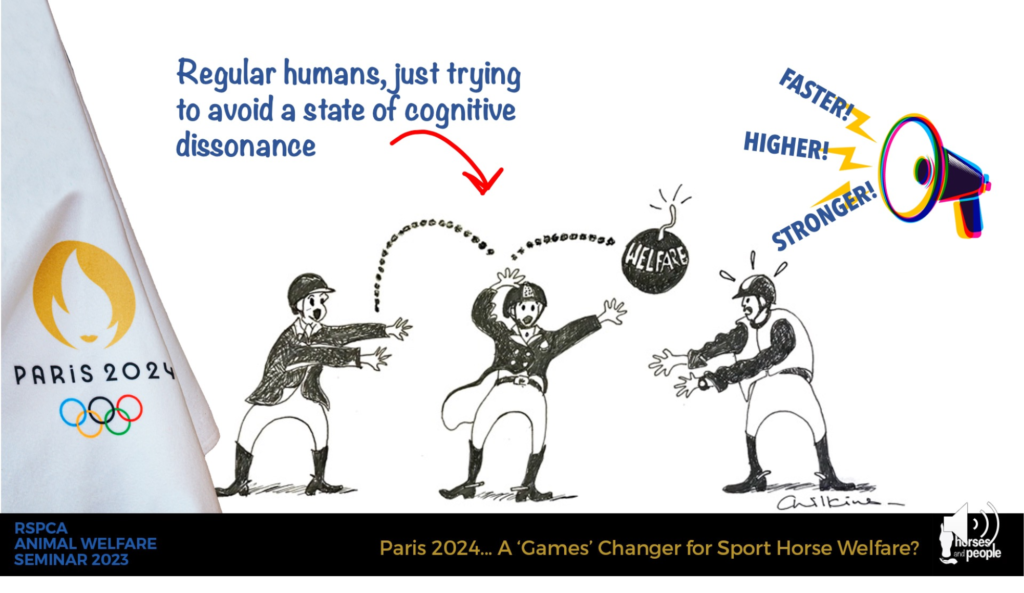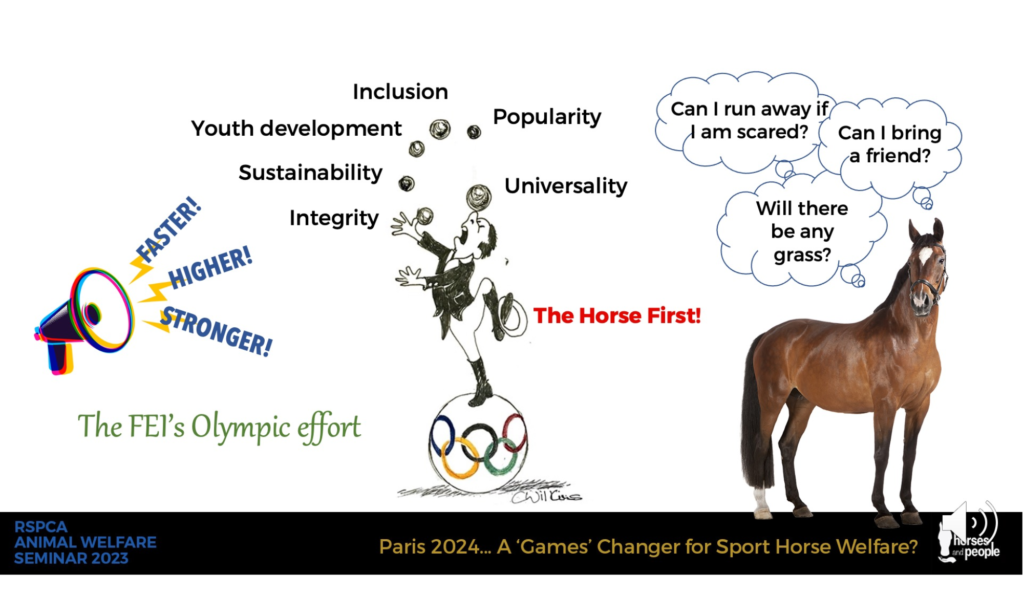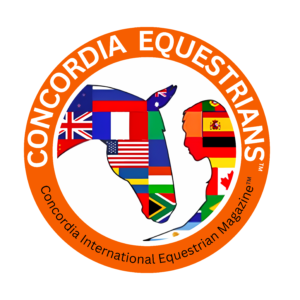WILL PARIS 2024 be an OLYMPIC GAMES CHANGER?
Or will self-justification, disparate views, a lack of the definition of welfare and the commercial interests driving the Fédération Equestre Internationale (FEI) block the French welfare initiative?
By Cristina Wilkins

The French welfare initiative
The question of whether horses belong in the Olympic Games is not a new one, what is more recent, however, is the shift in public attitudes towards how animals are treated. This raises questions about whether the welfare of horses – or any animal – can be protected when athletes are pursuing Olympic glory.
This issue came to a head during the Tokyo 2021 Games when second-to-second coverage meant we also got to see some pretty dreadful moments. Reaction from the public and the media to the images and news being streamed from Tokyo poured even more fuel on the arguments that horses don’t belong in professional sports.
It turns out that the French National Assembly (the French Parliament) was paying close attention and probably weighing the pros and cons of having horses at their Olympic Games in Paris 2024. The French government commissioned a report which was published in May last year and which explained the welfare incidents of Tokyo as the reason why.
“The equestrian events at the Paris 2024 Olympic Games must be a model in terms of equine welfare.”
The 73-page report directly addresses the Paris Games organizing committee with 46 recommendations very carefully detailing exactly what they would like to see added, changed or improved in the rules, and explain why this is warranted.
They want to see improvements to facilities, feeding, and enforcing the rules, they want changes to equipment rules and a tightening of veterinary controls.
There are also specific recommendations for each discipline – dressage, showjumping, eventing – as well as for pentathlon because, at this stage, the worldwide ban on its equestrian phase applies only after Paris.
Finally, and importantly, the French parliamentary group recommends incentivizing good welfare they say, and I quote:
“An equine welfare scoring system could be in place during training and competitions, over the entire duration and presence of the horse in the Olympic precinct…”
A score would be awarded at the end of each event, with a brief explanation of the bonuses and penalties obtained by each horse. The details of the mark would be accessible to everyone on the Internet. This would allow teams to pay more attention to equine well-being, to raise awareness among amateur and professional riders at a lower level and finally, to offer the general public a positive message about this sport.
Is the Olympic Charter compatible with equine welfare?
The Olympic Charter is a 112-page document that outlines the foundations upon which the Olympic movement is built. It states that Olympism is a philosophy of life, based on the joy of effort, the educational value of a good example – social responsibility and respect for universal and fundamental ethical principles. Whose goal is to service the harmonious development of humankind, promoting a peaceful society and preserving human dignity.
Now, all of us who don’t just love… but are obsessed with horses – would like to think that these qualities are all compatible with good horsemanship. But there is another aspect to consider…
The Olympic motto: Faster, Higher, Stronger, Together, is at the heart of the Olympic movement. It has a universal appeal because it leverages the shared human motivation to leave a mark, to be respected and remembered by others. Marathon runners are a good example of just how much pain and suffering athletes will endure, simply to improve on a personal best.
We admire an athlete’s determination because, deep down, we all believe that suffering is almost necessary to feel that you really deserved that win.
Equestrian sport is built, and sold, on the idea that it is a partnership between equals. But does this mean it is not just acceptable but commendable to expect the horse to also stretch their physical and mental boundaries beyond their own safety and welfare to go faster, higher, and stronger?
Horses certainly have the speed, scope, and muscular power to carry humans to achieve faster, higher and stronger feats, but the evidence so far shows they do not have an intrinsic motivation to win Olympic medals. Horses are basically wired to eat and avoid being eaten!
Disparate views
There are many people who will argue and vehemently defend their belief that horses LOVE their sport, that they are WILLING partners, or that they will FIGHT for their rider’s aspirations of glory. I am going to assume that I am preaching to the converted and that like me, you believe it is much more likely that while the human is satisfying their need to prove themselves by achieving faster, higher, and stronger sporting feats, the horse is rather worried about staying safe. In any case, these disparate views of what the sport should be about and what changes are necessary are fuelling emotional debates, which are fragmenting the horse sector into camps.
There is no doubt that the expectations placed on the top horses and riders today are vastly different than before the Olympics fully embraced professional athletes, a process which took a couple of decades and culminated in 1992. Horse sports don’t operate in a vacuum. At that time, markets were being deregulated and we were all learning that everything can and must be commodified and make a profit. Horses are no exception.
A slippery slope – the influence from Olympic to grassroots
Once again, it’s all very good (perhaps) for the very best to face difficult tests, but it affects the entire sport all the way to the grassroots. For a start, it normalises the stretching of the horse’s physical and mental boundaries, and it exposes young ambitious riders to considering unethical practices from a young age. It may start with their boss or coach telling them to tighten a noseband, or put a slightly more severe bit on, and can devolve into them being expected to use electric spurs, or turn a blind eye to drugs, and other unethical and illegal practices.
My point is that the pressure to succeed, to ride horses to go faster, higher, stronger, creates incentives to push horses beyond ethical boundaries.
What is the definition of welfare?
And yet, the FEI tells us (and the International Olympic Committee) that everything is under control. There’s no need to worry, because the “Horse comes first, – at all times”.
Their website, media and communications teams are well-versed and never forget to use all the right words that match the Olympic values; sustainable, integrity, global and universal, fair play, equality, inclusion, and so on. But front and centre is always “Horse First: The Welfare of the horse is our top priority”.
However, we have a fundamental foundational issue here because the FEI has never ever defined what Welfare is.
How can riders and event officials give such high priority to something without defining what that something is? Unfortunately, it is not just the FEI, nobody seems to have agreed on a definition yet and I think this opens the door to people reaching their own conclusions.
Animal welfare scientists haven’t agreed on a definition either and I understand that one. Over the past 50 years, science has had to find sufficient and robust evidence to determine what can and can’t be evaluated objectively in terms of animal welfare. However, I think that today, the science is very close if not already there, and an agreed-upon definition would really help right now!
My preferred definition of animal welfare by far is this one attributed to David Fraser and colleagues:
“Welfare is the state of the animal’s body and mind, and the extent to which their nature is satisfied.”

A state of cognitive dissonance
Admitting that there are many serious safety and welfare issues in horse sports (let alone contemplating the possibility that at the elite level and in their current form they may be incompatible with improved safety and welfare outcomes), is like volunteering to go into a state of massive cognitive dissonance.
Cognitive dissonance refers to the mental discomfort of becoming aware that we are holding contradictory information or beliefs. It generates a tremendous mental toll that can only be alleviated by choosing to believe one or the other. Once we take a side, we justify our choice and gradually become deaf and blind to any evidence that challenges it.
This unconscious refusal to consider the other side’s arguments or evidence, is known as a confirmation bias and it is what polarises opinion. Each side remains blinded (or blinkered), unable to see the contradictions for what they are, and prevents us from coming up with creative ideas going forward.
All the time the sport has to serve the human need to compete “faster-higher-stronger”, the incentives will be weighted on justifying or denying that we are pushing horses beyond ethical boundaries.
It will be very difficult to adopt the recommendations made by the French National Assembly because they align with our current understanding of animal welfare, which is that what matters is the horse’s subjective experience.
Those who are very invested in believing in the current system, for example those whose income and identity revolves around professional horse sports, will do their best to avoid contemplating the moral dilemmas and contradictions the recommendations raise.
They will defend the status quo and continue to believe in their decisions, and diminish, deny, or blindly ignore any counterarguments or evidence.
The FEI will continue its Olympic effort of persuading the IOC that horse sports can do everything for everyone. That they uphold all the Olympic values and above all “put the horse first!” – and the faster, higher, stronger aims, which align beautifully with the human motivation to test ourselves and leave a mark, will continue to overshadow the horse’s need for safety, friends, forage, and freedom.
